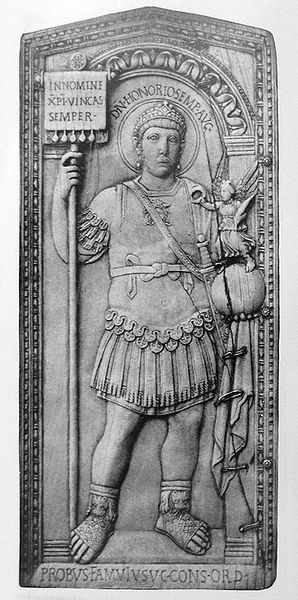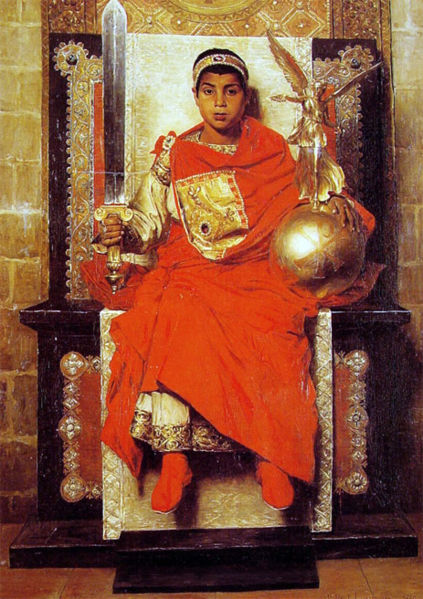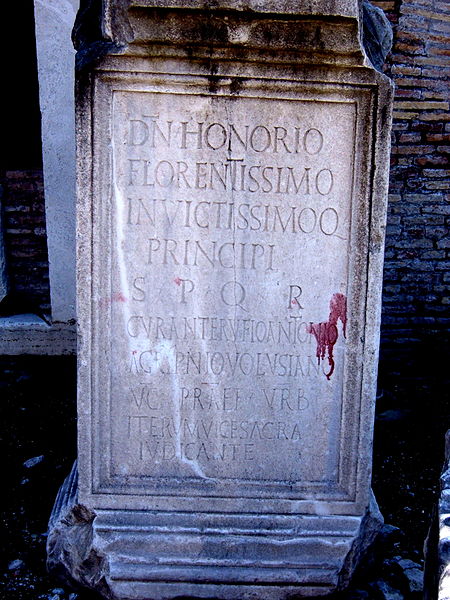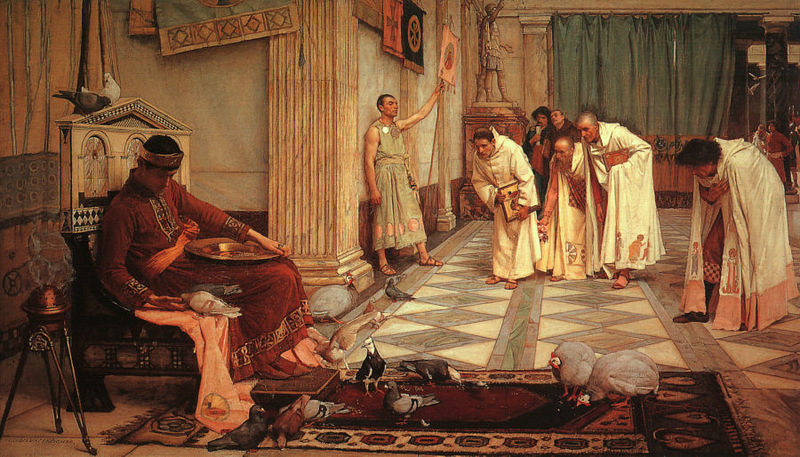<Back to Index>
- Mathematician Frank Morley, 1860
- Composer Josef Stránský, 1872
- Emperor of the Western Roman Empire Flavius Honorius Augustus, 384
PAGE SPONSOR



Honorius (Latin: Flavius Honorius Augustus; 9 September 384 – 15 August 423), was Western Roman Emperor from 395 to 423. He was the younger son of emperor Theodosius I and his first wife Aelia Flaccilla, and brother of the eastern emperor Arcadius.
Even
by the standards of the rapidly declining Western Empire, Honorius'
reign was precarious and chaotic. His reign was supported by his
principal general, Flavius Stilicho,
who was successively Honorius's guardian (during his childhood) and his
father - in - law (after the emperor became an adult). Stilicho's
generalship helped preserve some level of stability, but with his
execution, the Western Roman Empire moved closer to collapse. After holding the consulate at the age of two, Honorius was declared Augustus by his father Theodosius I, and thus co-ruler, on 23 January 393 after the death of Valentinian II and the usurpation of Eugenius. When
Theodosius died, in January 395, Honorius and Arcadius divided the
Empire, so that Honorius became Western Roman Emperor at the age of ten. During
the first part of his reign Honorius depended on the military
leadership of the general Stilicho, who had been appointed by Theodosius and was of mixed Vandal and Roman ancestry. To strengthen his bonds with the young emperor, Stilicho married his daughter Maria to him. The epithalamion written for the occasion by Stilicho's court poet Claudian survives. He was also greatly influenced by the Popes of Rome, who sought to extend their influence through his youth and weak character. So it was that Pope Innocent I contrived to have Honorius write to his brother, condemning the deposition of John Chrysostom in 407. At first Honorius based his capital in Mediolanum, but when the Visigoths under King Alaric I entered Italy in 402 he moved his capital to the coastal city of Ravenna, which was protected by a ring of marshes and strong fortifications. While
the new capital was easier to defend, it was poorly situated to allow
Roman forces to protect central Italy from the increasingly regular
threat of barbarian incursions. It was also historically significant in
that it was the emperor's presence here until the overthrow of the last
western Roman emperor in 476 that was probably the reason why Ravenna
was chosen, not only as the capital of the Ostrogothic Kingdom in Italy,
but also for the seat of the Byzantine exarchs as well. Honorius'
reign was plagued by almost constant barbarian incursions into Gaul,
Italy and Hispania, whilst at the same time, a host of usurpers rose up
due to the apparent inability of the emperor to see to the empire's
defences. The first crisis faced by Honorius was a revolt led by Gildo, the Comes Africae and Magister utriusque militiae per Africam, in Northern Africa, which lasted for two years (397 – 398). It was eventually subdued by Stilicho, under the local command of Mascezel, the brother of Gildo. The
next crisis was the Visigoth invasion of Italy in 402 under the
formidable command of their king, Alaric. Stilicho was absent in Raetia in the latter months of 401, when Alaric, who was also the eastern empire's magister militum in Illyricum, suddenly marched with a large army to the Julian Alps and entered Italy. Stilicho
hurried back to protect Honorius and the legions of Gaul and Britain
were summoned to defend Italy. Honorius, slumbering at Milan was caught
unaware and quickly fled to Asti, only to be pursued by Alaric, who marched into Liguria. Stilicho defeated Alaric at Pollentia, on the river Tanarus on Easter Day (April 6, 402) Alaric retreated to Verona, where Stilicho attacked him again. The Visigoths, weakened, were allowed to retreat back to Illyricum. Then in 405, an enormous barbarian army, composed of Ostrogoths, Alans, Vandals and Quadi, numbering some 500,000 and led by Radagaisus crossed the frozen Rhine and invaded Italy, bringing devastation to the heart of the Empire, until Stilicho defeated them in 406. The situation in Britannia was
even more problematic. The British provinces were isolated, lacking
support from the Empire, and the soldiers supported the revolts of Marcus (406 – 407), Gratian (407), and Constantine III. Constantine invaded Gaul in 407, occupying Arles, and while Constantine was in Gaul, his son Constans ruled over Britain. By 410, Britain was effectively told to look after its own affairs and expect no aid from Rome. There was good reason for this as the western empire was effectively overstretched due to the massive invasion of Alans, Suevi and Vandals who although they had been repulsed from Italy in 406, moved into Gaul on 31 December 406, and arrived in Hispania in 409. In early 408, Stilicho attempted to strengthen his position at court by marrying his second daughter, Thermantia, to Honorius after the death of the empress Maria in 407. Another
invasion by Alaric was prevented in 408 by Stilicho when he forced the
Roman Senate to pay 4,000 pounds of gold to persuade the Goths to leave
Italy. Honorius, in the meantime, was at Bononia, on his way from Ravenna to Ticinum,
when the news reached him of his brother's death in May 408. He at
first was planning to go to Constantinople to help set up the court in
the wake of the accession of Theodosius II. Summoning
Stilicho from Ravenna for advice, Stilicho advised Honorius not to go,
and proceeded to go himself. In Stilicho’s absence, a minister named
Olympius began currying favour with Honorius. Whispering in his ear, he
convinced the emperor that his Arian father - in - law was conspiring with the barbarians to overthrow Honorius. On
his return to Ravenna, Honorius ordered the arrest and execution of
Stilicho. With Stilicho’s fall, Honorius moved against all of his former
father - in - law’s allies, killing and torturing key individuals and
ordering the confiscation of the property of anyone who had borne any
office while Stilicho was in command. He ordered his wife Thermantia to
be taken from the imperial throne and given over to her mother. He also
ordered Eucherius, the son of Stilicho, put to death. In 409, Alaric returned, and with the agreement of the Senate supported the usurpation of Priscus Attalus. In 410, the Eastern Roman Empire sent six Legions (6,000
men; due to changes in tactics, legions of this period were about 1000
soldiers, down from the 6000 soldier legions of the Republic and early
Empire periods) to
aid Honorius. To counter Priscus, Honorius tried to negotiate with
Alaric. Alaric withdrew his support for Priscus in 410, but the
negotiations with Honorius broke down. Alaric again entered Italy and sacked Rome. The revolt of Constantine III in the west continued through this period. In 409, Gerontius, Constantine III's general in Hispania, rebelled against him, proclaimed Maximus Emperor, and besieged Constantine at Arles. Honorius now found himself an able commander, Constantius, who defeated Maximus and Gerontius, and then Constantine, in 411. Gaul was again a source of troubles for Honorius: just after Constantius' troops had returned to Italy, Jovinus revolted in northern Gaul, with the support of Alans, Burgundians, and the Gallic nobility. Jovinus tried to negotiate with the invading Goths of Ataulf (412), but his proclamation of his brother Sebastianus as Augustus made
Ataulf seek alliance with Honorius. Honorius had Ataulf settle the
matter with Jovinus, and the rebel was defeated and executed in 413. At the same time, Heraclianus raised the standard of revolt in North Africa, but failed to launch an invasion of Italy. Defeated he fled back to Carthage and was killed. In
414, Constantius attacked Ataulf, who proclaimed Priscus Attalus
emperor again. Constantius drove Ataulf into Hispania, and Attalus,
having again lost Visigoth support, was captured and deposed. In the
eleventh consulship of Honorius and the second of Constantius, the
Emperor entered Rome in triumph, with Attalus at the wheels of his
chariot. Honorius punished Attalus by cutting off his right finger and
thumb, inflicting the same fate that Attalus threatened Honorius with.
Remembering how Attalus had suggested that Honorius should retire to
some small island, he returned the favor by banishing Attalus to the
island of Lipara. Northeastern Gaul became subject to even greater Frankish influence, while a treaty signed in 418 granted to the Visigoths the southwestern portion, the former Gallia Aquitania.
Under the influence of Constantius, Honorius issued the Edict of 418,
which was designed to enable the Empire to retain a hold on the lands
which it was determined to surrender to the Goths. It relaxed the administrative bonds that connected all the Seven Provinces (The Maritime Alps, Narbonensis Prima, Narbonensis Secunda, Novempopulania, Aquitania Prima, Aquitania Secunda and Viennensis)
with the central government, by removing the imperial governors and
allowing the inhabitants, as a dependent federation, to conduct their
own affairs, for which purpose representatives of all the towns were to
meet every year in Arles. In 417, Constantius married Honorius' sister, Galla Placidia, much against her will. In 421, Honorius recognized him as co-emperor Constantius III; however,
when the announcement of his elevation was sent to Constantinople,
Theodosius refused to recognise him. Constantius, enraged, began
preparations for a military conflict with the eastern empire but before
he could commence the planned intervention, he died early in 422. In
420 – 422, another Maximus (or perhaps the same) gained and lost power in
Hispania. By the time of Honorius’s death in 423, Britain, Spain and
large parts of Gaul had effectively passed into barbarian control. In
his final years, Honorius reportedly developed a physical attraction to
his step - sister, and in order to escape his unwelcome attentions, Galla
Placidia and her children, the future emperor Valentinian III and his sister, Honoria, fled to Constantinople. The most notable event of his reign was the assault and Sack of Rome on August 24, 410 by the Visigoths under Alaric. The
city had been under Visigothic siege since shortly after Stilicho's
deposition and execution in the summer of 408. Lacking a strong general
to control the by now mostly barbarian Roman Army, Honorius could do
little to attack Alaric's forces directly, and apparently adopted the
only strategy he could in the situation: wait passively for the
Visigoths to grow weary and spend the time marshalling what forces he
could. Unfortunately, this course of action appeared to be the product
of Honorius' indecisive character and he suffered much criticism for it
both from contemporaries and later historians. Whether
this plan could have worked is perhaps debatable. In any case it was
overtaken by events. Stricken by starvation, somebody opened Rome's
defenses to Alaric and the Goths poured in. The city had not been under
the control of a foreign force since an invasion of Gauls some eight
centuries before. The sack itself was notably mild as sacks go; Churches
and religious statuary went unharmed for example. The psychological
blow to the Romans was considerably more painful. The shock of this
event reverberated from Britain to Jerusalem, and inspired Augustine to write his magnum opus, The City of God. The year 410 also saw Honorius reply to a British plea
for assistance against local barbarian incursions, called the 'Rescript
of Honorius'. Preoccupied with the Visigoths, Honorius lacked any
military capability to assist the distant province. According to the sixth century Byzantine scholar Zosimus, "Honorius wrote letters to the cities in Britain, bidding them to guard themselves." This sentence is located randomly in the middle of a discussion of southern Italy;
no further mention of Britain is made, which has led some, though not
all, modern academics to suggest that the rescript does not apply to
Britain, but to Bruttium in Italy. In his History of the Wars, Procopius mentions a story (which Gibbon disbelieved)
where, on hearing the news that Rome had "perished", Honorius was
initially shocked; thinking the news was in reference to a favorite chicken he had named "Roma". "At
that time they say that the Emperor Honorius in Ravenna received the
message from one of the eunuchs, evidently a keeper of the poultry, that
Rome had perished. And he cried out and said, 'And yet it has just
eaten from my hands!' For he had a very large cock, Rome by name; and
the eunuch comprehending his words said that it was the city of Rome
which had perished at the hands of Alaric, and the emperor with a sigh
of relief answered quickly: 'But I thought that my fowl Rome had
perished.' So great, they say, was the folly with which this emperor was
possessed." Procopius, The Vandalic War (III.2.25 – 26) Summarizing his account of Honorius' reign, the historian J.B. Bury wrote,
"His name would be forgotten among the obscurest occupants of the
Imperial throne were it not that his reign coincided with the fatal
period in which it was decided that western Europe was to pass from the
Roman to the Teuton." After listing the disasters of those 28 years,
Bury concludes that Honorius "himself did nothing of note against the
enemies who infested his realm, but personally he was extraordinarily
fortunate in occupying the throne till he died a natural death and
witnessing the destruction of the multitude of tyrants who rose up
against him." Honorius
issued a decree during his reign, prohibiting men from wearing trousers
in Rome [Codex Theodosianus 14.10.2–3]. The last known gladiatorial fight took place during
the reign of Honorius.
Honorius died of edema on August 15, 423, leaving no heir. In the subsequent interregnum Joannes was nominated emperor. The following year, however, the Eastern Emperor Theodosius II elected his cousin Valentinian III, son of Galla Placidia and Constantius III, as emperor.
